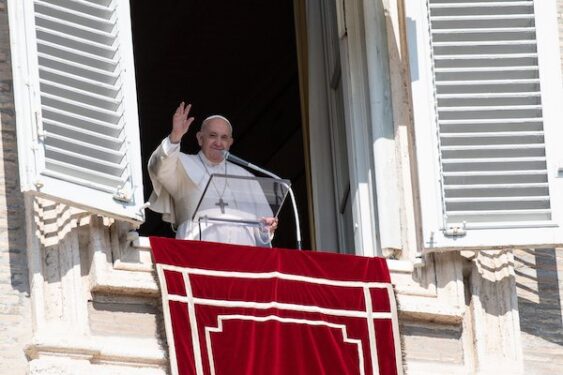By Elise Ann Allen, Senior Correspondent
ROME (Crux) — Although terrorism and violent attacks had become a sad reality in the international community, there were declines in 2020 according to the U.N. and groups that track terrorist attacks around the world.

But violent attacks are again making headlines, including the recent stabbing of a British parliamentarian.
Pope Francis referenced several of these attacks in his Sunday Angelus address, pointing to separate incidents that took place in Afghanistan, Norway, and England in the past week alone.
Speaking to pilgrims gathered in St. Peter’s Square and those watching at a distance, Pope Francis noted that “last week various attacks were carried out, for example, in Norway, Afghanistan, and England, which resulted in numerous victims and injuries.”
“I express my closeness to the families of victims,” he said, and asked those responsible for the attacks to “please, abandon the path of violence, which is always a loss, which is a defeat for everyone. Let us remember that violence breeds violence.”
Norway
The first of the attacks Pope Francis mentioned took place Wednesday, when a 37-year-old Danish man killed five people, including an off-duty police officer, and injured three others with a bow-and-arrow and other weapons during the nearly half-hour rampage.
During the assault — which marked the worst attack in Norway since far-right extremist Anders Breivik massacred 77 people 10 years ago — the man reportedly attacked his victims in the streets and also forced his way into houses and a supermarket.
A Muslim convert, the man is now in police custody and is being held in a medical facility awaiting psychiatric evaluation.
While a variety of motives such as anger, revenge, impulse, jihad, illness, and provocation are being investigated, a complete psychiatric evaluation is required to determine whether the man can be held legally responsible for his actions, or whether he is mentally ill. The process to determine this could take several months.
England
On Friday, British lawmaker David Amess, 69, was stabbed repeatedly in an attack at Belfairs Methodist Church in Leigh-on-Sea in Essex, east of London, during a meeting with constituents in a church. Amess later died of his wounds.
A 25-year-old British man has been detained in relation to the attack on Amess, who belonged to Britain’s Conservative Party and was a member of the UK’s House of Commons.

Amess was a practicing Catholic and father of five who had served in Parliament since 1983, and who was known as one of Parliament’s most pro-life members.
He established the All-party Parliamentary Group in 2006 to manage relations with the Holy See Group as a means of gathering people from different faith backgrounds belonging to each of the UK’s major parties in a bid to improve relations with the Vatican.
Amess also played a pivotal role in organizing Pope Benedict XVI’s visit to the United Kingdom in 2010, and he also led several parliamentary visits to Rome.
Following his murder, Cardinal Vincent Nichols, president of the Catholic Bishops’ Conference of England and Wales, called Amess’s death a “painful loss.”
“This death throws a sharp light onto the fact that our Members of Parliament are servants of the people, available to people in their need, especially in their constituencies,” he said. “This horrific attack, as David was undertaking his constituency surgery [where parliamentarians hold face-to-face meetings with constituents], is an attack on our democratic process and traditions.”
Afghanistan
Also on Friday, at least 41 people were killed, and 70 others were wounded in a suicide attack at a mosque in Kandahar, marking the second consecutive week that a Shi’a Mosque in Afghanistan has been targeted.
Last Friday, a suicide bombing in the northeastern city of Kunduz left more than 100 people dead.
A regional branch of the Islamic State, IS-K, took responsibility for Friday’s bombing, which drew some 15 ambulances on site, and which prompted the Taliban to ask citizens to donate blood to help victims.
Friday’s bombing was the latest in what appears to be an increasing string of suicide attacks carried out by the Islamic State since the Taliban takeover of Kabul and the withdrawal of U.S. troops in August.
IS-K has carried out multiple attacks in Afghanistan in the past and opposes the country’s Taliban rulers, prompting fears that as the Taliban asserts its authority and tightens its control of the country, more innocent blood will be shed as bombings continue.
Kandahar is Afghanistan’s second-largest city and considered to be the spiritual birthplace of the Taliban, making the attack by IS-K appear to be a direct challenge to the Taliban’s rule.
UN Secretary-General António Guterres condemned the attack in a statement, calling the bombing “despicable.
“The perpetrators of this latest crime against civilians in Afghanistan exercising their right to freely practice their religion must be brought to justice,” he said.
